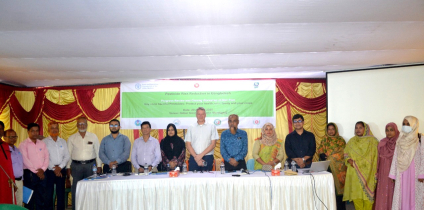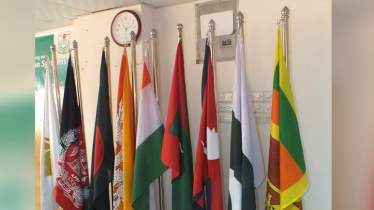
Bangladesh Food Security Network – KHANI and Participatory Research and Action Network – PRAAN, in collaboration with The Daily Star, hosted a policy dialogue on July 17, 2025, titled "Protecting the Farmers: The Case for an Agricultural Price Commission." The discussion brought together experts, policymakers, and farmers to examine the challenges facing Bangladesh’s agricultural sector and explore solutions to ensure fair crop pricing.
Nurul Alam Masud, Chief Executive of PRAAN, highlighted the declining contribution of agriculture to the national GDP and the rising incidents of farmer suicides. Between January and April this year, 12 farmers took their own lives, prompting a fact-finding mission that investigated recent cases. The Bangladesh Trade and Tariff Commission’s survey across four districts and 20 markets confirmed that farmers are not receiving fair prices, while middlemen retain disproportionate profits, underscoring the need for institutional intervention.
Keynote presenter Umme Salma emphasized the inefficiencies in the agricultural market, citing potato production in 2023–24 as an example. Despite a harvest exceeding projections, prices remained high, reflecting persistent profiteering and limited benefits reaching farmers.
Cases of financial distress were cited to illustrate systemic failures. In Meherpur, farmer Saiful Sheikh committed suicide after severe losses on his onion crop left him unable to repay debts. In Rajshahi, Mir Ruhul Amin died by suicide under similar financial pressures. Investigations revealed high input costs, unaffordable seeds and pesticides, unreliable markets, and limited access to formal credit. Farmers are often forced to resort to microfinance schemes with harsh repayment schedules, creating unsustainable debt burdens.
Rezaul Karim Siddiqui, Vice-Chair of KHANI, criticized the government’s focus on urban priorities, noting that farmers face exploitation through high input costs and low output prices. Weak monitoring and unregulated distribution of seeds exacerbate the problem. Ayesha Khatun, a female farmer from Koyra Upazila, described how coastal fishermen and small-scale farmers struggle to earn fair returns due to price disparities and limited market access.
Professor Dr. Mihir Kumar Roy underscored that government-determined staple prices frequently exclude farmers’ input, and political neglect undermines the potential benefits of Bangladesh’s strong agricultural production. Dr. Md Abdul Muyeed explained that farmers cannot adjust crop prices in response to rising input costs, often leading to severe debt and despair. The proposed Agricultural Price Commission could provide real-time market data, improve access to wholesale markets, and reduce reliance on intermediaries, thereby stabilizing incomes.
Professor Sharmind Neelormi highlighted the disparities in crop costs, emphasizing that policy must account for differences between crops such as onion, boro rice, and aman rice. Current loan schemes and storage costs can impose additional financial burdens, demanding careful government intervention.
Former Secretary Anwar Faruque pointed to gaps in agricultural data, procurement coordination, and institutional support, noting that countries like West Bengal procure significant proportions of rice and wheat, whereas Bangladesh struggles to maintain even minimal procurement levels. Dr. Jahangir Alam Khan stressed that a dedicated price commission could create a framework for fair, incentive-based pricing that protects farmers’ livelihoods.
Farah Kabir of ActionAid Bangladesh emphasized the need for meaningful farmer representation, particularly for women, and the importance of crop diversification, value addition, insurance schemes, and innovative storage solutions. Dr. Md Mahmudur Rahman noted that comprehensive reforms are being developed to monitor input costs, enhance post-harvest services, and balance the interests of farmers and consumers.
Secretary Dr. Mohammad Emdad Ullah Mian outlined the Ministry of Agriculture’s strategic plan, emphasizing data-driven support systems, including mobile applications, AI-based disease diagnostics, real-time weather updates, drone technology, and collaboration with NGOs, banks, and international agencies to strengthen market access and financial safety nets. Regulatory measures are currently limited to preventing market prices from falling below production costs plus a 10 percent profit margin.
Moderator Tanjim Ferdous concluded that the policy dialogue was a call for fairness, transparency, and accountability in agricultural markets. Establishing an Agricultural Price Commission could stabilize markets, protect farmers from exploitation, and ensure that the sector’s contribution to food security and economic growth is recognized. Recommendations included guaranteeing minimum support prices, expanding storage and post-harvest facilities, providing affordable credit, delivering real-time market data, promoting agro-processing and value addition, and ensuring inclusive farmer participation in policymaking.





